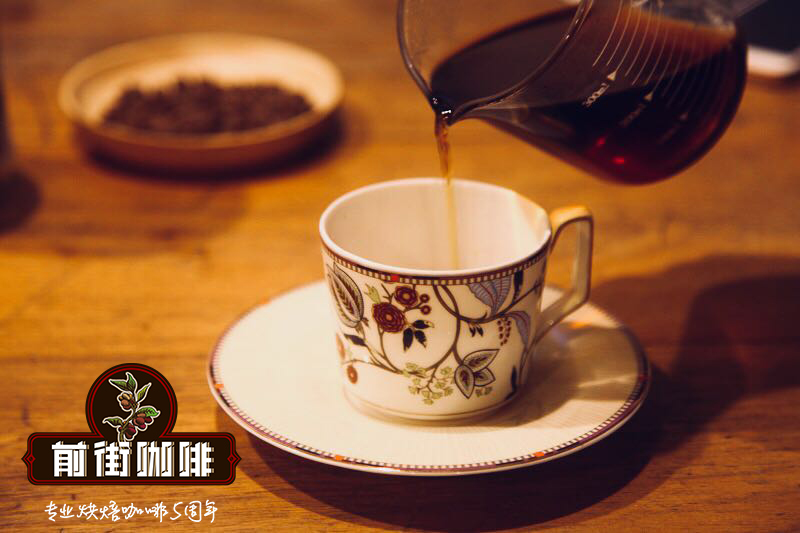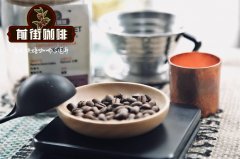Cold knowledge, some relationships between Arabica and Robasta
Professional coffee knowledge exchange more coffee bean information please follow the coffee workshop (Wechat official account cafe_style)

People who know a little bit about coffee now basically say, "I want 100% Arabica."
Arabica is good coffee and Robusta can only be instant, which has become a stereotype in many people's minds.
Whether it's Mana, Kenna, 7, or Rina, coffee is as bad as death, and the banner of 100% Arabica is high.
Robusta, who was disliked by the broad masses of the people, hid silently in the corner and did not know whether to be happy or lonely, and his mood HIN was complicated.
Because Arabica, who is very popular and compared with himself, is actually his own son!
The coffee beans we usually call "Robusta" or "stout seed" belong to the "Canephora" or "Congolese" family. However, the brothers and sisters of the Congolese family are not very successful, and in the end, Robusta is the only one widely recognized by mankind. So we can say that the two major commercial beans are "Arabica and Robusta" or "Arabica and Canipra", but the former is more commonly used and more familiar.
So how did Canipra (Robusta) become the father of Arabica?
About 25000 years ago, Canipra Coffee, which grew up in East Africa, met a coffee named Eugenioides and fell in love with her at first sight.
So, with Canipra as the paternal line and Eugenie Odes as the matrilineal line, a wonderful work was born under the happy combination of two cups of coffee.
Yes, this is Arabica.
Why is it weird?
Because Arabica's genes are very complex, with quadruple chromosomes (44 pairs), while paternal Canipura and maternal Eugeniodes have normal diploid chromosomes (22 pairs).
Two different genes combine to produce mutations
Scientists have done a large number of experiments to try to replicate the mutation, although there are some changed samples (such as 33 pairs of chromosomes), but can not survive at all. In the end, they can only temporarily regard the birth of Arabica as "a rare single event that cannot be replicated."
The newborn calf Arabica could not restrain its vitality and spread rapidly, all the way into the forests of present-day Ethiopia until it appeared in the diet of Ethiopian people in the 6th century AD. This leads to the saying that coffee comes from Ethiopia.
Then Arabica coffee spread from Ethiopia to Yemen and then to India, and from India was spread by European colonists to Southeast Asia, Europe (botanical garden greenhouse) and Central and South America.
Arabica coffee has rich flavor, high sugar content and good taste, but its disease resistance is weak. After experiencing the tragedy that rust leaf disease destroyed the entire national coffee industry, botanists returned to Africa to try to find more disease-resistant varieties in the native place of coffee.
Father Luo Dou was in this mood at that time.
In this way, Arabica's paternal Kanipra (Robusta) came into the eyes of the coffee industry and occupied 20% to 30% of the coffee market with its strong disease resistance, higher caffeine content, lower production cost and other advantages.
Arabica, which made its debut earlier, has always held 70% and 80% of the share, firmly occupying the C position and unshakable.
Let's be fair to Papa Luo: not everyone in the Arabica family is expensive, but there are only 7% or 10% of fine beans. And Luodou is not all bad. High-quality Luodou can actually outperform many non-boutique Arabica.
As for Arabica's matrilineal Eugene Niodes, although its share in the coffee trade is almost negligible, the national beauty cannot be concealed.
In the 2015 World Cooking Competition, a Colombian Eugene Odes entered the world finals as the champion of the US division. She has the flavor of tropical fruit (such as jackfruit), high sweetness but no acid at all, very special. I believe that in the future, more and more coffee lovers will come into contact with,
Important Notice :
前街咖啡 FrontStreet Coffee has moved to new addredd:
FrontStreet Coffee Address: 315,Donghua East Road,GuangZhou
Tel:020 38364473
- Prev

Attitudes and views of Chinese people on Coffee drinking in recent years
Professional coffee knowledge exchange more coffee bean information Please pay attention to the coffee workshop (Wechat official account cafe_style) Chinese people do not have the habit of drinking coffee, coffee is not a necessity of life, and most domestic coffee consumers are no more than the following two reasons: ① as a more powerful than tea, healthier than tobacco as a refreshing medicine; ② is as Western music
- Next

What is the history of coffee cultivation in Uganda?
Professional coffee knowledge exchange more coffee bean information please follow the coffee workshop (Wechat official account cafe_style) Uganda, I believe that many coffee lovers and baristas, are familiar, but also some strange. It is familiar because Ugandan coffee has recently emerged in international competitions, and several high-quality Ugandan coffees have been introduced in China. And strangers, because of Uganda.
Related
- What is the difference between Indonesian Sumatra Mantinin coffee and gold Mantinin? How to distinguish between real and fake golden Mantelin coffee?
- What does bypass mean in coffee? Why can hand-brewed coffee and water make it better?
- Unexpected! Ruixing Telunsu lattes use a smoothie machine to foam milk?!
- % Arabia's first store in Henan opens into the village?! Netizen: Thought it was P's
- Does an authentic standard mocha coffee recipe use chocolate sauce or powder? Mocha Latte/Dirty Coffee/Salty Mocha Coffee Recipe Share!
- What is the difference between Vietnam egg coffee and Norway egg coffee? Hand-brewed single product coffee filter paper filter cloth filter flat solution!
- What is the difference between sun-cured and honey-treated coffee? What are the differences in the flavor characteristics of sun-honey coffee?
- How to make Italian latte! How much milk does a standard latte use/what should the ratio of coffee to milk be?
- How to make butter American/butter latte/butter Dirty coffee? Is hand-brewed coffee good with butter?
- Is Dirty the cold version of Australian White? What is the difference between dirty coffee/decent coffee and Australian white espresso?

